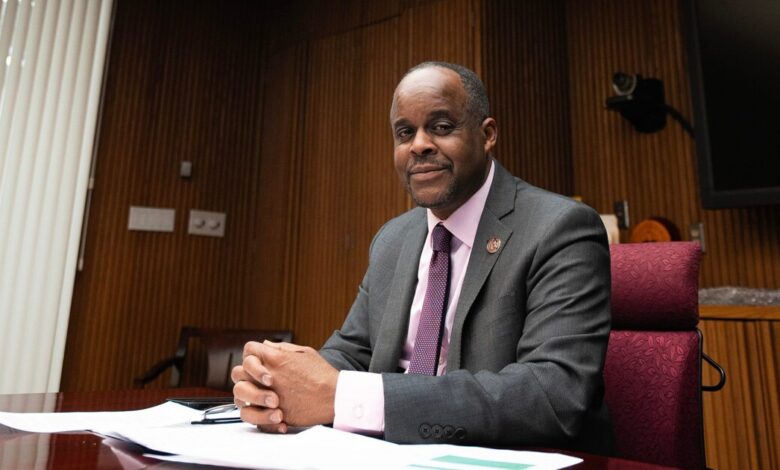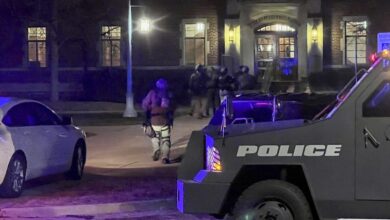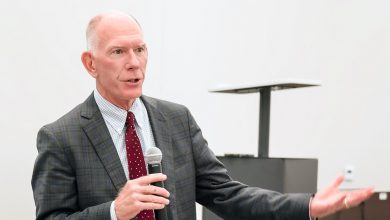After Challenging Stints at 2 Struggling Colleges, a President Will Step Down

[ad_1]
A university president will step down from his second leadership post in three years, after a tenure in which he worked to reverse enrollment declines but also faced an investigation over concerns about his management style.
Jack Thomas, the president of Central State University, a historically Black institution in Wilberforce, Ohio, also contended with strong opposition at his previous institution, Western Illinois University; supporters there said a campaign to oust Thomas, who is Black, was racially motivated.
Thomas said on Monday he’d resign as president of Central State and join the faculty as a tenured professor after a sabbatical, rather than seek renewal of his contract, which is set to expire next month. He made that decision “having accomplished what I set out to do as president,” including jump-starting a new strategic plan and a $75-million campus expansion, he wrote in a letter to the university community.
Thomas said he was busy with meetings on Tuesday and referred The Chronicle to his letter in response to emailed questions. He declined to comment on the claims about his management style, citing employee lawsuits against the university.
“The board thanks Dr. Thomas for his service to the university and the progress that the university has made during his time as president,” Mark Hatcher, the chair of Central State’s board, said in a statement. “The board will immediately begin plans for a search for Dr. Thomas’s successor.”
Thomas’s three-year tenure at Central State has been marred by claims of discrimination, wrongful termination, and a toxic work environment. Those accusations were levied against him by five current and former female employees, all of whom are Black and held leadership positions. They wrote to Central State’s board last August alleging mistreatment.
An independent investigation by a Cincinnati-based law firm found Thomas’s behavior problematic — describing his behavior toward some female employees as “rude, belittling, and bullying” — but noted it “does not rise to the level of harassment,” the Dayton Daily News reported. (Two of the women subsequently filed a lawsuit against Central State; their lawyer, David Duwel, did not return a phone call on Tuesday requesting comment.)
Thomas also had to deal with scrutiny of a free-tuition program at Central State. In 2020, the university began offering a free-college program for union employees through an online-program manager, or OPM. Eastern Gateway Community College, also in Ohio, offered a similar deal. Students who earned associate degrees at Eastern Gateway could then transfer to Central State and finish their bachelor’s degrees.
The arrangement brought thousands of new students to Central State, which had struggled with enrollment for years. In the fall of 2019, the university enrolled about 2,000 students. Three years later, enrollment had grown to more than 5,400 students, with 3,600 of them fully online. Eastern Gateway, meanwhile, enrolled tens of thousands of online learners.
But then the Higher Learning Commission, which accredits both institutions, raised concerns about the educational quality of Eastern Gateway’s program. And last year, the U.S. Education Department ordered Eastern Gateway to shut it down, saying the financial arrangement was illegal. Central State followed suit in January after discussions with federal officials.
Enrollment challenges were a central feature of Thomas’s eight years at Western Illinois, too. The university saw a 35-percent drop in enrollment, the elimination of academic majors and the demolition of dorms, and more than 100 people losing their jobs in a decade. People who supported Thomas at the time said the problems weren’t entirely his fault: Population declines in the Midwest were already putting pressure on the institution, and a lengthy state-budget impasse made matters worse. But some critics pointed at the president’s office.
Disagreements over how much Thomas was to blame for the crisis caused a schism in Macomb, Ill., the town of 15,000 that’s home to Western. The conflict pitted the mostly white business community against prominent Black residents who saw opposition to the president as bad racial optics, according to a 2019 Chronicle investigation.
Among other criticisms of Thomas at Western Illinois were that he prioritized “diversity over excellence” in hiring and that he’d been less than fully transparent in discussions with trustees that violated public-meetings law.
Some observers also protested the fact that, in a decade, the student body had gone from about 13 percent people of color to 34 percent, with one trustee expressing concern about the “ethnicity” of the university. “I know certainly that some of the opposition to Jack is racist,” one emeritus professor wrote to a trustee in an email leaked to local media, “but even if he were purple he has been a near total failure here.” (Both the professor and the trustee were white.)
When Thomas departed Western Illinois, he negotiated a generous exit package that granted him two years of administrative leave at his base salary of $270,000, alongside annual annuity contributions of $27,000, life insurance, and health insurance. Under that agreement, Thomas and Western Illinois agreed not to disparage one another; the university was to respond to prospective employers who reached out about Thomas “by emphasizing his accomplishments.”
Thomas’s three-year contract at Central State calls for him to be paid $300,000 in the final year, plus benefits, the Dayton Daily News reported.
[ad_2]
Source link






